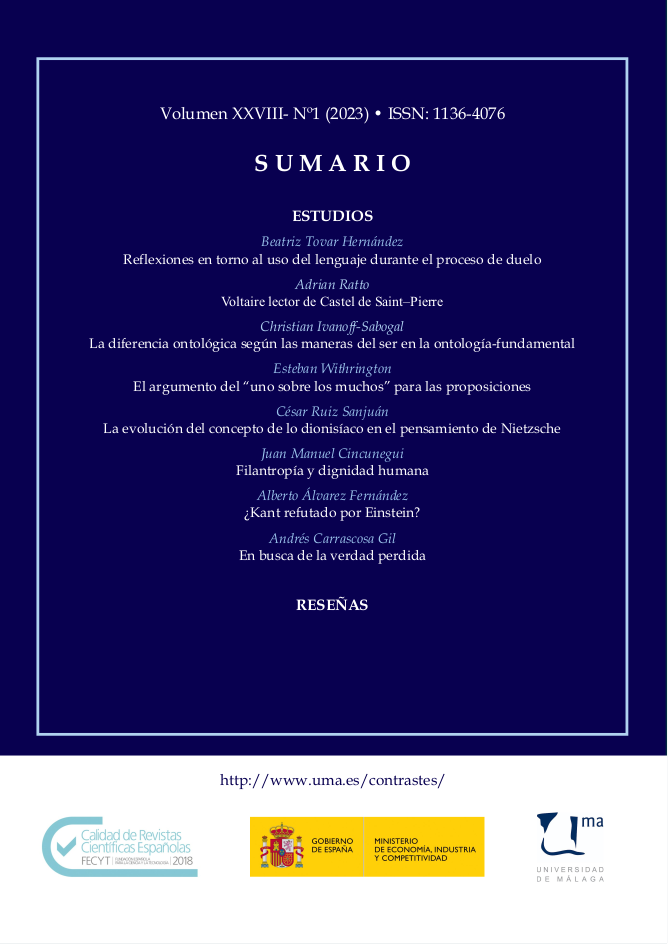The «One over Many» Argument for Propositions
DOI:
https://doi.org/10.24310/Contrastescontrastes.v28i1.13979Keywords:
MEANINGS, PROPOSITIONS, PLATONISM, ONE-OVER-MANY, NATURALISMAbstract
The meanings of utterances and thoughts are commonly regarded in philosophical semantics as abstract objects, called «propositions», which account for how different utterances and thoughts can be synonymous and which constitute the primary truth-bearers. I argue that meanings are instead natural properties that play causal roles in the world, that the kind of «One over Many» thinking underlying the characterization of shared meanings as abstract objects is misguided and that utterances and thoughts having truth-values in virtue of their meanings does not entail that meanings themselves are truth-bearers.
Downloads
Metrics
Publication Facts
Reviewer profiles N/A
Author statements
Indexed in
-
—
- Academic society
- N/A
- Publisher
- Universidad de Málaga
References
Aristotle. Metaphysics. Translated by W. D. Ross. Clarendon Press / Oxford 1908.
Armstrong, D. (1978). Nominalism and Realism: Universals and Scientific Realism. Vol. 1. Cambridge University Press.
Armstrong, D. (2004). Truth and Truthmakers. Cambridge University Press.
Austin, J. L. (1950). «Truth». Proceedings of the Aristotelian Society, supp. Vol. 24, pp. 111-128.
Balaguer, M. (1998). «Attitudes without Propositions». Philosophy and Phenomenological Research, Vol. 58, No. 4, pp. 805-826. https://doi.org/10.2307/2653723
Bealer, G. (1998). «Propositions». Mind, Vol. 107, Issue 425, pp.1-32. https://doi.org/10.1093/mind/107.425.1
Church, A. (1956a). «Propositions and Sentences». The Problem of Universals, by I. M. Boche?ski, A. Church, N. Goodman. University of Notre Dame Press, pp. 3-11.
Church, A. (1956b). Introduction to Mathematical Logic. Princeton University Press.
Devitt, M. (1996). Coming to Our Senses: A Naturalistic Program for Semantic Localism. Cambridge University Press.
Devitt, M. (2010). Putting Metaphysics First. Oxford University Press.
Frege, G. (1956). «The Thought». Translated by A. M. and Marcelle Quinton. Mind, Vol. 65, No. 259, pp. 289-311.
Haack, S. (1978). Philosophy of Logics. Cambridge University Press.
Horwich, P. (1998). Truth (second edition). Oxford University Press.
Kaplan, D. (1989). «Demonstratives». Themes for Kaplan. Almog, Perry and Wettstein (eds.). Oxford University Press, pp. 481-563.
Kirkham, R. (1992). Theories of Truth: A Critical Introduction. The MIT Press.
Moltmann, F. (2003). «Propositional Attitudes without Propositions». Synthese, 135, pp. 77–118. https://doi.org/10.1023/A:1022945009188
Pitcher, G. (ed.) (1964). Truth. Prentice-Hall: Englewood Cliffs.
Plato. Republic. Translated by C. D. C. Reeve. Hackett Publishing Company 2004.
Quine, W.V.O. (1961). From a Logical Point of View. Harvard University Press.
Russell, B. (1921). The Analysis of Mind. George Allen and Unwin.
Schiffer, S. (1992). «Belief Ascription». The Journal of Philosophy, Vol. 89, No. 10, pp. 499-521. https://doi.org/10.2307/2941005
Downloads
Published
How to Cite
Issue
Section
License
This journal provides immediate free access to its content under the principle of making research freely available to the public. All content published in Contrastes. Revista Internacional de Filosofía, are subject to the Creative Commons Attribution-NonCommercial-ShareAlike 4.0 license whose full text can be found at <http://creativecommons.org/licenses/by-nc-sa/4.0>
It is the responsibility of the authors to obtain the necessary permissions of the images that are subject to copyright.
Authors whose contributions are accepted for publication in this journal will retain the non-exclusive right to use their contributions for academic, research and educational purposes, including self-archiving or repository in open access repositories of any kind.
The electronic edition of this magazine is edited by the Editorial Service of the University of Malaga (Uma Editorial), being necessary to cite the origin in any partial or total reproduction.










5.png)
